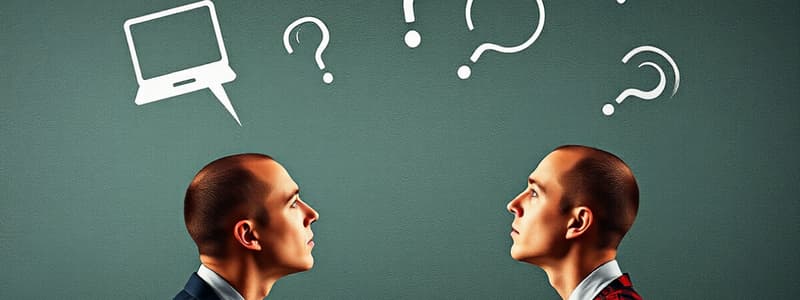Podcast
Questions and Answers
What best describes the role of motivation in volitional activities?
What best describes the role of motivation in volitional activities?
- Motivation regulates emotional responses but does not affect behavior directly.
- Motivation is primarily concerned with long-term goals and ignores immediate needs.
- Motivation is solely a biological process that influences physical actions.
- Motivation serves as a dynamic process managing both physiological and psychological aspects of behavior. (correct)
Which statement correctly explains the concept of motives in volitional actions?
Which statement correctly explains the concept of motives in volitional actions?
- Motives can shift between being primary or secondary based on individual circumstances and perspectives. (correct)
- All motives are fixed and do not change in different circumstances.
- Motives can only be classified as either primary or secondary without variability.
- Motives are solely based on physiological needs and do not include social factors.
What distinguishes extrinsic motivation from intrinsic motivation?
What distinguishes extrinsic motivation from intrinsic motivation?
- There is no difference; both terms refer to the same concept of driving behavior.
- Extrinsic motivation relies on external rewards, while intrinsic motivation comes from within and is self-driven. (correct)
- Extrinsic motivation is motivated by internal goals, while intrinsic motivation is based on external rewards.
- Intrinsic motivation is limited to activities that require physical effort, whereas extrinsic motivation can apply to mental tasks.
Which motive is classified as a physiological or primary motive?
Which motive is classified as a physiological or primary motive?
Which of the following is NOT a characteristic element of motivation?
Which of the following is NOT a characteristic element of motivation?
How can motives be influenced according to the discussed concepts?
How can motives be influenced according to the discussed concepts?
Which of the following illustrates a secondary motive in volitional actions?
Which of the following illustrates a secondary motive in volitional actions?
What type of motivation is characterized by behaviors driven by external rewards?
What type of motivation is characterized by behaviors driven by external rewards?
Flashcards are hidden until you start studying
Study Notes
Motivation Overview
- Motivation is a dynamic process impacting physiological and psychological management of human behavior.
- It defines the direction, organization, and stability of activities.
Motives and Their Classification
- Motive is a stable internal psychological cause driving a person's behavior and actions.
- Motives for volitional actions can be categorized into two main groups: main and secondary.
- The classification of motives can vary depending on circumstances and individuals.
Examples of Motives
- For one individual, the desire for knowledge may be paramount for writing a dissertation, while for another, social status may take precedence.
- Needs, emotions, feelings, interests, and beliefs are foundational to motives of volitional actions.
Types of Motives
- Physiological (Primary or Organic) Motives: Include basic needs such as hunger, thirst, and sleep.
- Personal (Social or Secondary) Motives: Encompass social goals, competition, and individual interests.
Function of Motivation
- Motivation directs and energizes human and organism behaviors, acting at both conscious and unconscious levels.
Types of Motivation
- Extrinsic Motivation: Driven by external rewards and reinforcers, such as praise and awards.
- Intrinsic Motivation: Fueled by internal rewards like a sense of achievement and personal satisfaction.
- Addiction: Represents an unhealthy form of motivation where rewards diminish, leading to dependence rather than satisfaction.
Studying That Suits You
Use AI to generate personalized quizzes and flashcards to suit your learning preferences.




